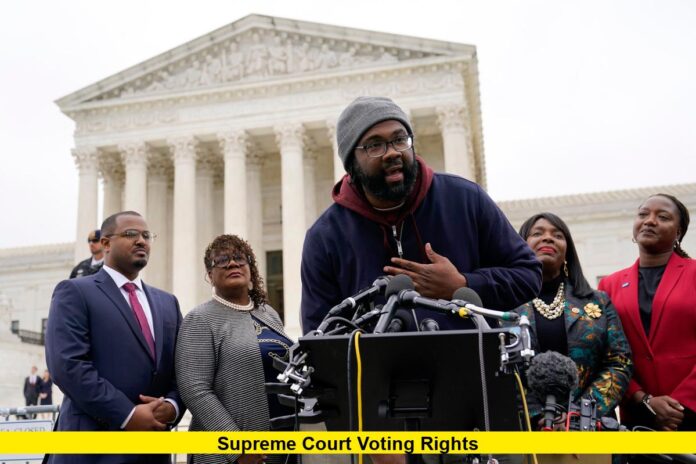╔═══════════════════════════════════════════════════════════════════════════╗
║ Key Points Summary ║
║ – Supreme Court halts 8th Circuit ruling limiting Voting Rights Act. ║
║ – Private citizens retain right to sue over racial discrimination for ║
║ now in seven states. ║
║ – The critical Section 2 provision remains enforceable by individuals. ║
║ – Split decision: three conservative justices would have let ruling go ║
║ into effect. ║
║ – Outcome affects Native American, minority voters in key regions. ║
║ – Case rooted in North Dakota tribal map dispute advancing to review. ║
║ – Stay remains until Supreme Court decides whether to hear the case. ║
╝═══════════════════════════════════════════════════════════════════════════╝
Supreme court voting rights have taken center stage again this week as the United States Supreme Court issued a pivotal order on July 24, 2025, putting a temporary halt on a lower court decision that threatened to limit the power of the Voting Rights Act (VRA) in seven states. This emergency stay maintains for now the crucial legal protection that allows private citizens and organizations to challenge racially discriminatory voting laws, especially under Section 2—the core provision that has shaped election fairness since the 1960s.
The immediate cause for this action was a controversial ruling from the 8th Circuit Court of Appeals, which asserted that only the federal government, not private parties, could enforce Section 2 of the VRA in states like Arkansas, Iowa, Minnesota, Missouri, Nebraska, North Dakota, and South Dakota. Section 2 is the backbone of protections against racial discrimination in voting, having formed the basis of most litigation to secure minority voting rights since the passage of VRA in 1965.
In the case at hand, Native American tribes and individuals in North Dakota challenged a legislative map they argued diluted Native American voting strength and violated the VRA. After a district court ordered more representative maps, the 8th Circuit reversed the right of tribes and individuals to bring their case—an unprecedented move with nationwide implications. Advocacy and civil rights groups immediately sounded the alarm, noting that more than 90% of VRA cases since its inception have been brought by private plaintiffs, not the Department of Justice.
On Thursday, the Supreme Court suspended the 8th Circuit decision. While unsigned and delivered without a detailed explanation, the order preserves private enforcement of Section 2 at least until the high court decides whether to fully review the case. Notably, three conservative justices—Clarence Thomas, Samuel Alito, and Neil Gorsuch—publicly dissented, saying they would have let the restrictions begin now.
The impact is immediate and highly consequential:
- Minority voters, especially Native Americans in North Dakota, will continue voting under fairer maps as litigation proceeds.
- Private and civil rights groups retain standing to challenge racially biased electoral laws in the seven affected states.
- The fate of private enforcement, however, rides on whether the Supreme Court hears the case and how it rules. If the high court ultimately upholds the 8th Circuit’s approach, millions could lose critical protections, and the Justice Department would become the sole entity able to sue. Legal experts warn this could weaken the ability to fight racially discriminatory voting changes swiftly and effectively, as the DOJ typically pursues only a fraction of such cases per year.
For added context, here’s a glance at how Section 2 cases have historically worked:
| Year | Who Could Sue | Typical Outcomes | Current Status |
|---|---|---|---|
| Pre-2025 | Private citizens, DOJ | Predominantly private wins | Stay in effect; private suits allowed |
| May 2025 – July 24 | DOJ only (per 8th Circuit ruling) | Severe curtailment of new cases | Supreme Court stay, reviewing case |
This major dispute began with Turtle Mountain Band of Chippewa Indians and Spirit Lake Tribe, who litigated over North Dakota’s 2021 redistricting map. A federal trial led to the election of three Native American lawmakers who likely would not have won seats under the older map. The 8th Circuit’s position, also impacting a recent Arkansas case, flies against decades of legal precedent nationwide. Most appellate courts previously recognized private enforcement as essential to guaranteeing minority voting rights.
Legal observers and rights groups see the Supreme Court’s intervention as a critical, albeit temporary, reprieve. The justices’ decision to block the lower court reflects both the gravity of what’s at stake and continued division even within the Supreme Court itself. As the petitions proceed and the justices contemplate full review in the next term, the Supreme Court voting rights saga remains a focal point for civil rights in the U.S.
The wider legal community, advocacy groups, and affected communities are closely watching for further developments. The stay means the Voting Rights Act continues to protect all voters against racial discrimination, at least for now.
How do you feel about the Supreme Court’s latest action on voting rights protections? Share your thoughts below or check back soon for more updates on this critical story.
